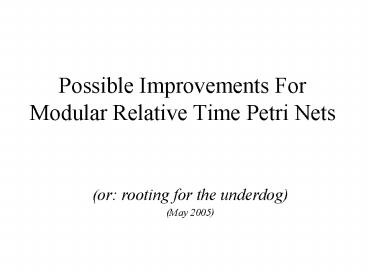Possible Improvements For Modular Relative Time Petri Nets - PowerPoint PPT Presentation
1 / 15
Title: Possible Improvements For Modular Relative Time Petri Nets
1
Possible Improvements For Modular Relative Time
Petri Nets
(or rooting for the underdog) (May 2005)
2
Contents
- Revision
- Helping or Hiding?
- Truncation
- Modular Truncation
- Exhaustion, Prediction, Saturation, Prohibition
- Conclusion
3
Revision
- State space explosion is a problem
- Modular independence is a desirable design goal
- Timed systems are a desirable design goal
- Will it be even worse for both at once?
4
Helping or Hiding?
- Relative time vs Absolute time cost?
- Relative time ageing firing
- Absolute firing
- Are we bailing more water just by having a bigger
bucket? - ie. Why not just use absolute congruence?
5
Helping or Hiding? (contd)
- Lazy Relative Time Petri Nets
- Same idea, but we are less stringent in ageing
- Now have two firing rules
- Normal age(marking) inputs outputs
- Lazy marking inputs delay(outputs)
- Now we can decide the time we spend between
exploring vs looking for cycles.
6
Truncation
- Truncation is based on only observable behaviours
being interesting. - If ageing a token will not change the nets
behaviour then dont bother ageing it. - We call this the omega limit for a place.
- This prevents the long tail effect in timed
systems (ie. an infinite divergence)
7
Modular Truncation
- Problem global time vs relative time?
- Solution keep the local systems in relative time
still, apply the global time only at the points
it is necessary. - Problem we still risk the long tail problem
for any non-trivial system. - Solution modular time truncation!
8
Modular Truncation (contd)
- Same rule if ageing a modules time stamp will
not change the systems behaviour - But when is this true?
- When the local activity is exhausted
- When the local activity is predictable
- When the local activity is saturated
- When the local activity is prohibitive
9
Exhaustion
- When the global time has advanced so far that the
module must be deadlocked by now - Can it really be that easy?
- Not quite, but almost!
- We need to remember that the rule is about
possible behaviours, not just the next one.
10
Exhaustion (contd)
- A locally deadlocked process may have other
timers waiting to expire as well! - So, our exhaustion maximum will be
- max(max(omega), max(pathsrcomegadest))
11
Prediction
- What if there is a local cycle that can be
performed while the module waits? - Sounds like a relative time congruence
- We reduce the age of the time stamp to the
previous age with an identical local marking - Similar to exhaustion, but we only take the
shortest path for each identical destination.
12
Saturation
- What about non-deterministic and/or multiple
local cycles? - Be fair this is a messy model, but we will
still do our best to help it out. ? - We need to determine the reachable states
- smear(src,t) dest clock(src,,dest) t
- If the smear set is stable, we stop ageing.
13
Prohibition
- Some modules may stop participating forever
(either by design or by accident). - ie. all paths at least that long are strictly
local - The previous cases will still cover this, but
prediction (for example) still wastes time. - A prohibited module should have its timer
switched off, once it is completely local.
14
Modular Truncation (contd)
- But this seems costly!
- Are we making things worse?
- Except that these properties
- are local and static!
- And a finite number is better than infinity!
15
Conclusion
- What is the relevance of RTPNs?
- Can we do something faster than anyone else?
- Can we do something new to anyone else?
- Can we spend time to make time?
- Extra firing time vs wasted exploration time
- More calculations up front vs fewer per step































